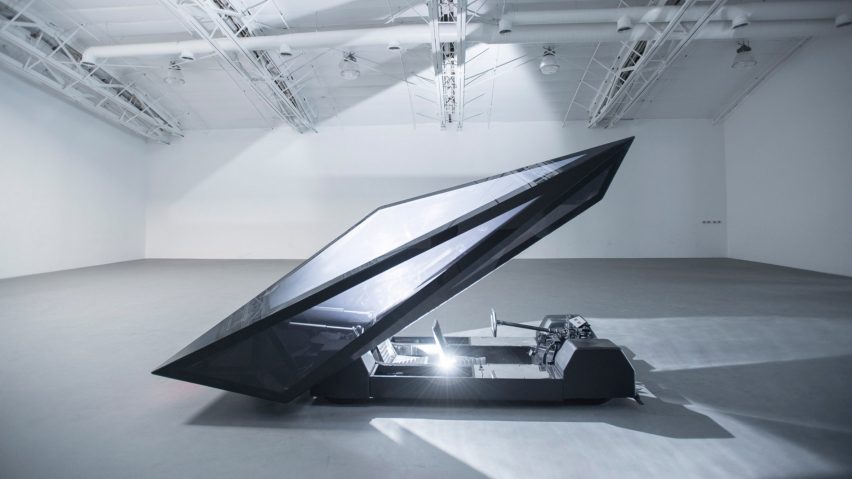An abstracted Lamborghini, a scrunched-up bike and a motorcycle operated by a smartphone are among the pieces showcased in an exhibition at the Petersen Automotive Museum in Los Angeles.
The exhibition Disruptors features work by Rem D Koolhaas and Joey Ruiter, two renowned creatives who have both explored automotive design. An array of objects are on view, ranging from a high-heel shoe and sunglasses to vehicles powered by humans or motors.
"Disruptors is a critical analysis on how two designers with backgrounds in fashion, architecture and industrial design have come to perceive the automobile," said Terry L Karges, executive director of LA's Petersen Automotive Museum, in a statement.
"This exhibit is unlike any other we've presented in the past because the content challenges common perceptions of vehicles, and the presentation is appropriately unconventional in its aesthetic."
Ruiter, who is based in Michigan, has worked with a range of brands to create unconventional furniture, household objects, powerboats and other pieces.
Koolhaas, a nephew of Dutch architect Rem Koolhaas, founded the footwear brand United Nude in 2003. Last year the company moved its headquarters from Guangzhou to Los Angeles.
The exhibition is staged in a spacious gallery in the four-storey Petersen Automotive Museum, which was renovated by Kohn Pedersen Fox in 2015. The exhibition design, featuring black walls and white text, was conceived by a team from United Nude.
The centrepiece of the show is two concept cars by Koolhaas and Ruiter.
"Although Koolhaas and Ruiter do not come from automotive backgrounds, they both independently began applying their dramatic design approaches to the automobile, resulting in vehicles with limited facets and curves that are still technically advanced and fully functional," the museum said.
The Lo Res Car by Koolhaas was envisioned as an abstracted Lamborghini Countach, a sports car designed by Italian car designer Marcello Gadini in the early 1970s. Koolhaas' version is a two-seater vehicle with an angular steel frame and a smoky polycarbonate body.
Instead of opening doors, drivers enter the vehicle by lifting up a top portion that is attached to the back of the car via hinges. The cockpit features tandem seating and a hexagonal steering wheel. Powered by an electric engine, the car can travel up to 50 kilometres per hour (kph).
Other objects on view by Koolhaas include several pieces from United Nude's Lo Res collection, including sunglasses, a bracelet and a Mary Jane-style pump. Featuring triangulated planes, the Lo Res designs evolved from the studio's exploration into 3D scanning technology.
In contrast to Koolhaas' faceted designs, the pieces by Ruiter have a simpler profile.
The Consumer Car by Ruiter takes the shape of a chunky, trapezoidal block. The open-top, low-slung car has four wheels, which are hidden behind a black body made of metal and the high-tech fabric Xorel.
The car's front grill consists of a two-way mirror, with LED bands concealed behind the reflective surface. The lights become visible when turned on.
Another vehicle by Ruiter is Moto Undone, which offers an alternative to the traditional motorcycle and its bold decoration, exposed mechanical components and loud exhaust system.
Ruiter's motorbike has an aluminium exterior that hides mechanical equipment, including an electric engine that "enables its rider to dissolve silently into the surroundings". Physical controls have been removed, as the vehicle is operated using a smartphone.
Additional designs by Ruiter include the Inner City Bike 36, a minimalist bicycle that has a seat, grips, brakes and two wheels – all of which are tightly arranged. The human-powered vehicle provides "only what is essential for cutting through short, circuitous routes punctuated by highly populated spaces".
The Disruptors exhibit runs through next March. To learn about other exhibitions around the world, visit Dezeen's month-by-month list of the best architecture, design and technology events in 2019.

